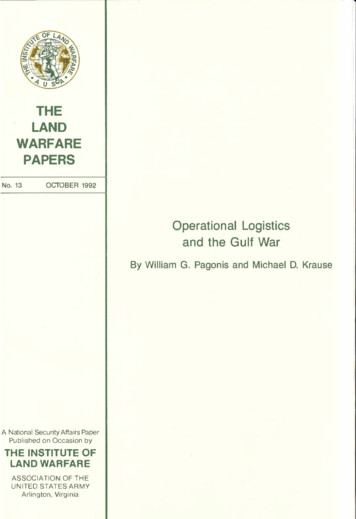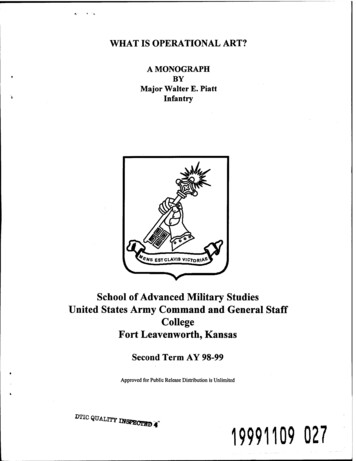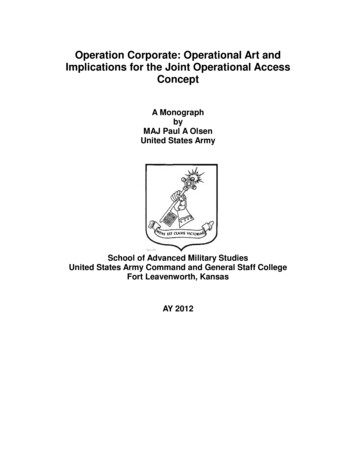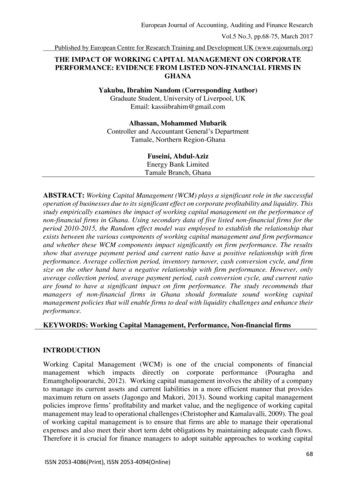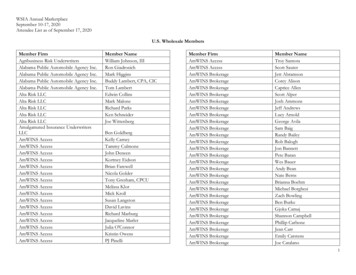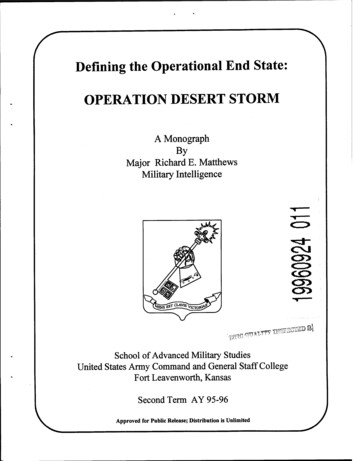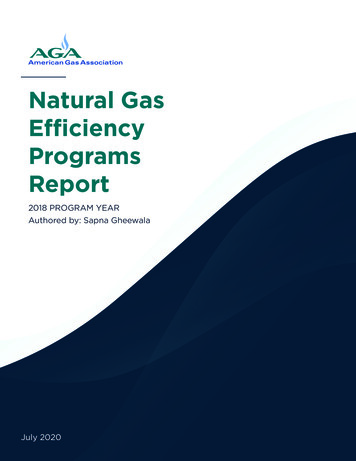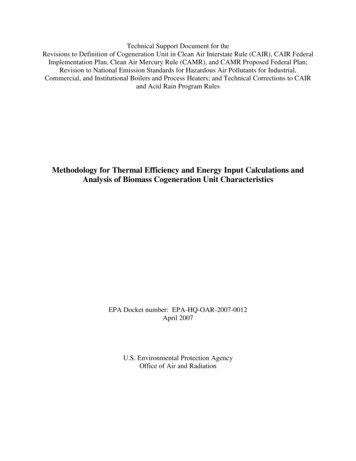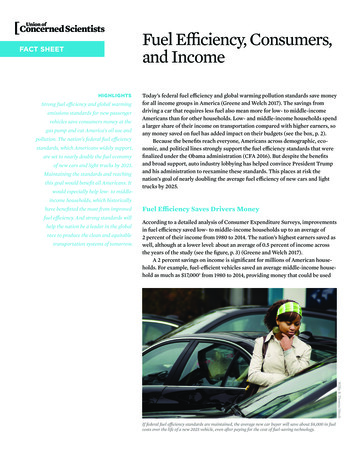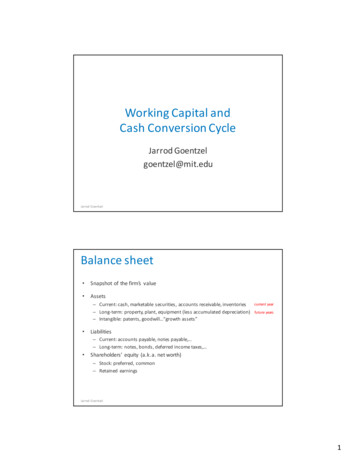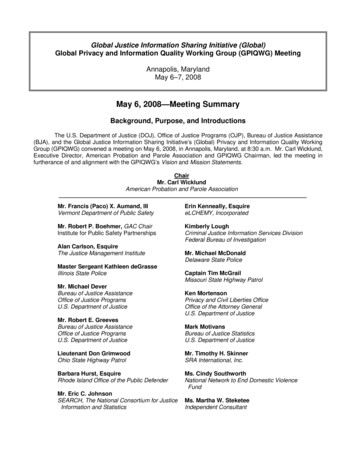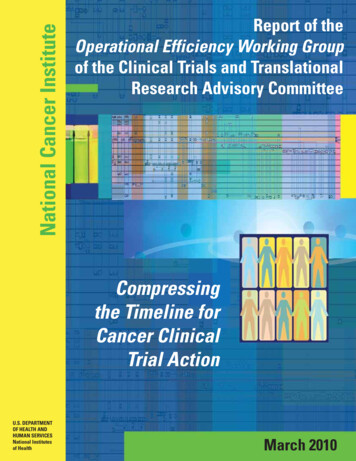
Transcription
National Cancer InstituteReport of theOperational Efficiency Working Groupof the Clinical Trials and TranslationalResearch Advisory CommitteeCompressingthe Timeline forCancer ClinicalTrial ActionU.S. DEPARTMENTOF HEALTH ANDHUMAN SERVICESNational Institutesof HealthMarch 2010
Report of theOperational Efficiency Working Groupof the Clinical Trials and TranslationalResearch Advisory CommitteeCompressingthe Timeline forCancer ClinicalTrial ActionMarch 2010
Compressing the Timeline for Cancer Clinical Trial Activation ! " & " &, % ' (( )& ! # ) ! # " ), ! # % *& Report of the CTAC Operational Efficiency Working GroupPage i
Compressing the Timeline for Cancer Clinical Trial Activation ChairJames H. Doroshow, M.D.DirectorDivision of Cancer Treatment and DiagnosisNational Cancer InstituteBethesda, MDCo-ChairGabriel Hortobagyi, M.D., FACPProfessor of Medicine and ChairDepartment of Breast Medical OncologyUniversity of TexasMD Anderson Cancer CenterHouston, TXMembersJames Abbruzzese, M.D.Professor of Medicine and ChairDepartment of Gastrointestinal MedicalOncologyUniversity of TexasMD Anderson Cancer CenterHouston, TXJeffrey Abrams, M.D.Associate Director, Cancer Therapy EvaluationProgramDivision of Cancer Treatment and DiagnosisNational Cancer InstituteRockville, MDPeter Adamson, M.D.Director, Office of Clinical andTranslational ResearchChief, Division of Clinical Pharmacology &TherapeuticsThe Children's Hospital of PhiladelphiaChair-Elect, Children’s Oncology GroupPhiladelphia, PALaurence Baker, DOChair, Southwest Oncology GroupProfessor of Medicine and PharmacologyDepartment of Internal MedicineDepartment of PharmacologyUniversity of Michigan Medical SchoolAnn Arbor, MIKarla Ballman, Ph.D.Lead StatisticianDivision of StatisticsMayo ClinicRochester, MNAl B. Benson, M.D.Professor of MedicineDepartment of MedicineDivision of Hematology/OncologyNorthwestern UniversityChicago, ILKen Buetow, Ph.D.Associate Director of Bioinformatics andInformation TechnologyDirector, NCI Center for Bioinformatics andInformation TechnologyNational Cancer InstituteRockville, MDBill BroChief Executive OfficerKidney Cancer AssociationNonprofit Executive ScholarKellogg School of ManagementNorthwestern UniversityEvanston, ILJan Buckner, M.D.Chair, North Central Cancer Treatment GroupProfessor of OncologyMayo ClinicRochester, MNReport of the CTAC Operational Efficiency Working GroupPage iii
Compressing the Timeline for Cancer Clinical Trial ActivationRobert Califf, M.D.Vice Chancellor for Clinical ResearchDuke University Medical CenterDirector, Duke Translational Medicine InstituteDurham, NCRobert Comis, M.D.Chair, Eastern Cooperative Oncology GroupProfessor of MedicineDirector, Drexel University Clinical TrialsResearch CenterDrexel UniversityPhiladelphia, PAKenneth Cowan, M.D., Ph.D.Professor of OncologyDirector, Eppley Institute for Research in CancerDirector, University of Nebraska Medical CenterEppley Cancer CenterUniversity of NebraskaOmaha, NEKevin J. Cullen, M.D.Director, University of MarylandMarlene and Stewart Greenebaum CancerCenterProfessor of MedicineUniversity of Maryland School of MedicineBaltimore, MD 21201Walter Curran, M.D.Group Chair, Radiation Therapy OncologyGroupLawrence W. Davis Chair and Professor,Department of Radiation OncologyEmory University School of MedicineExecutive Director, Winship Cancer Center ofEmory UniversityAtlanta, GANancy Davenport-EnnisCEO and PresidentPatient Advocate FoundationNewport News, VA.Page iv David Dilts, Ph.D.Director of Clinical Research, Knight CancerInstituteProfessor of Healthcare Management, Divisionof ManagementOregon Health and Science UniversityPortland, ORPhilip DiSaia, M.D.Chair, Gynecologic Oncology GroupDirector and ProfessorDepartment of Gynecologic OncologyUniversity of California Irvine Medical CenterOrange, CACharles Erlichman, M.D.Chair, Department of OncologyProfessor of Gastroenterology Cancer ResearchMayo ClinicRochester, MNShanda Finnigan, RN, BSN, CCRCHealth Program Specialist, Cancer TherapyEvaluation ProgramDivision of Cancer Treatment and DiagnosisNational Cancer InstituteRockville, MDPatrick J. Flynn, M.D.Principal InvestigatorMetro-Minnesota Community ClinicalOncology ProgramSt. Louis Park, MNAndres Forero, M.D.Associate ProfessorDepartment of MedicineHematology/OncologyUniversity of Alabama at BirminghamBirmingham, ALLeslie Ford, M.D.Associate Director for Clinical ResearchDivision of Cancer PreventionNational Cancer InstituteRockville, MDReport of the CTAC Operational Efficiency Working Group
Compressing the Timeline for Cancer Clinical Trial ActivationPaula Fracasso, M.D., Ph.D.Lawrence W. Penniston, MD, Family Professorof Women's Oncology ResearchDepartment of MedicineDeputy Director, University of Virginia CancerCenterUniversity of Virginia Health SystemCharlottesville, VASteve Friedman, MHSAChief, Operations and Informatics, CancerTherapy Evaluation ProgramDivision of Cancer Treatment and DiagnosisNational Cancer InstituteRockville, MDGwendolyn Fyfe, M.D.ConsultantSan Francisco, CARobert Gray, Ph.D.Director, Eastern Oncology Group StatisticalCenterProfessor, Department of BiostatisticsDana Farber Cancer CenterBoston, MAMissak Haigentz, Jr., M.D.Assistant Professor of MedicineDepartment of Medicine (Oncology)Albert Einstein Cancer CenterMontefiore Medical CenterBronx, NYRosemarie Hakim, Ph.D.Coverage & Analysis GroupOffice of Clinical Standards and QualityCenters for Medicare & Medicaid ServicesBaltimore, MDLee Helman, M.D.Scientific Director for Clinical ResearchCenter for Cancer ResearchNational Cancer InstituteBethesda, MDMartha Hering, RN, CCRPCancer Trials Support UnitWestatRockville, MDKathleen KarasDirector of Protocol OperationsCancer and Leukemia Group BUniversity of ChicagoChicago, ILPatricia Keegan, M.D.Division Director for the Division of BiologicOncology ProductsOffice of Oncology Drug ProductsFood and Drug AdministrationSilver Spring, MD.Timothy Kuzel, M.D.Associate ProfessorDepartment of MedicineNorthwestern UniversityChicago, ILFrank L. Meyskens, Jr., M.D.Professor of MedicineDirector, UCI Chao Family ComprehensiveCancer CenterUniversity of California, IrvineOrange, CARalph Meyer, M.D. FRCPDirector, National Cancer Institute of CanadaClinical Trials GroupDepartment Of Oncology and MedicineQueen’s UniversityKingston, OntarioLori Minasian, M.D. FACPChief, Community Oncology and PreventionTrials Research ProgramDivision of Cancer PreventionNational Cancer InstituteRockville, MDReport of the CTAC Operational Efficiency Working GroupPage v
Compressing the Timeline for Cancer Clinical Trial ActivationMargaret Mooney, M.D.Chief, Clinical Investigations BranchCancer Therapy Evaluation ProgramDivision of Cancer Treatment and DiagnosisNational Cancer InstituteRockville, MDHeidi Nelson, M.D.Co-Chair, American College of SurgeonsOncology GroupFred C. Anderson ProfessorDepartment of SurgeryMayo ClinicRochester, MNMaura O’Leary, M.D.Administrative OfficerChildren’s Oncology GroupBethesda, MDDavid Parkinson, M.D.CEONodality, Inc.South San Francisco, CAJoseph L. Pater, M.D., M.Sc., FRCP(C)Vice PresidentClinical and Translational ResearchCancer Care OntarioToronto, OntarioRichard Pazdur, M.D.Office Director, Office of Oncology DrugProductsCenter for Drug Evaluation and ResearchFood and Drug AdministrationRockville, MDEdith Perez, M.D.Professor of MedicineDivision of Hematology and OncologyMayo ClinicJacksonville, FLSheila Prindiville, M.D., MPHDirector, Coordinating Center for Clinical TrialsNational Cancer InstituteRockville, MDPage vi Gregory Reaman, M.D.Chair, Children’s Oncology GroupProfessor of PediatricsDivision of Hematology/OncologyChildren’s National Medical CenterGeorge Washington UniversityWashington, DCLaura L. Reese, BSN, JDExecutive Director of OperationsGynecologic Oncology GroupPhiladelphia, PAAlan B. Sandler, M.D.Professor of MedicineDivision Chief, Hematology & MedicalOncologyDeArmond Chair, Clinical Cancer ResearchOregon Health & Science UniversityPortland, ORRichard L. Schilsky, M.D.Chairman, Cancer and Leukemia Group BProfessor of MedicineChief, Section of Hematology-OncologyDeputy Director, Comprehensive Cancer CenterUniversity of ChicagoChicago, ILMitch Schnall, M.D., Ph.D.Chair, American College of Radiology ImagingNetworkProfessor of RadiologyHospital of the University of PennsylvaniaPhiladelphia, PADan Sullivan, M.D.Associate Center Director for ClinicalInvestigationsSenior MemberMoffitt Cancer CenterTampa, FLJoel Tepper, M.D.ProfessorDepartment of Radiation OncologyUNC/Lineberger Comprehensive Cancer CenterUniversity of North Carolina School ofMedicineChapel Hill, NCReport of the CTAC Operational Efficiency Working Group
Compressing the Timeline for Cancer Clinical Trial ActivationAnne Tompkins, MSNHead, Protocol Information OfficeDivision of Cancer PreventionNational Cancer InstituteRockville, MDDonald L. Trump, M.D., FACPPresident & CEOProfessor of OncologyRoswell Park Cancer InstituteProfessor of MedicineUniversity at BuffaloBuffalo, NYGeorge J. Weiner, M.D.ProfessorDepartment of Internal MedicineDirector, Holden Comprehensive Cancer CenterUniversity of IowaIowa City, IALarry Wickerham, M.D.Associate Chairman, National Surgical AdjuvantBreast and Bowel ProjectAssociate Professor of Human OncologyDrexel University College of MedicinePittsburgh, PAJoyce Yasko, Ph.D.Vice President, Clinical ResearchAdministration and ServicesRoswell Park Cancer InstituteBuffalo, NYJamie Zwiebel, M.D.Chief, Investigational Drug BranchCancer Therapy Evaluation ProgramDivision of Cancer Treatment and DiagnosisNational Cancer InstituteRockville, MDExecutive SecretaryLinda K. Weiss, Ph.D.DirectorOffice of Cancer CentersNational Cancer InstituteBethesda, MDRaymond Petryshyn, Ph.D.Program DirectorCoordinating Center for Clinical TrialsNational Cancer InstituteRockville, MDReport of the CTAC Operational Efficiency Working GroupPage vii
Compressing the Timeline for Cancer Clinical Trial Activation In December 2008, the Operational Efficiency Working Group (OEWG) was established underauspices of the Clinical Trials and Translational Research Advisory Committee (CTAC) toadvise the National Cancer Institute (NCI) on strategies to reduce the time required to activateNCI-sponsored Cooperative Group and early drug development trials as well as NCI-DesignatedCancer Center investigator-initiated trials. The OEWG is a broadly constituted panel includingCooperative Group Chairs and Cancer Center Directors; clinical investigators, statisticians andprotocol specialists; academic and community oncologists; clinical trials leadership and stafffrom all relevant NCI divisions, programs and centers; representatives of pharmaceutical andbiotechnology companies and patient advocacy organizations; and representatives of the Foodand Drug Administration (FDA), Centers for Medicare & Medicaid Services (CMS) and NCI’sCancer Trials Support Unit (CTSU). Establishment of the OEWG represents the realization of Operational Efficiency New Initiative 2of the June 2005 Clinical Trials Working Group Report to the National Cancer Advisory Board:“Identify the institutional barriers that prolong the time from concept approval to accrual of thefirst patient, and develop solutions for overcoming these barriers.” In addition to this charge, theOEWG was also requested to identify strategies to increase the percentage of studies that reachtheir accrual targets in a timely fashion. The work of the OEWG was therefore divided into twophases, with the first addressing the reduction of trial activation time and the second addressingtimely completion of activated studies. This report describes the first phase of the OEWG’sactivity and presents the recommended initiatives resulting from that phase. To focus its deliberations, the OEWG made three initial decisions. The first was to excludeseveral matters that are beyond NCI’s jurisdiction: trial elements, such as consent forms, that areregulated by the Office of Human Research Protections of the Department of Health and HumanServices; state laws and requirements; and congressional funding mandates. The second,recognizing that different types of trials present different challenges, was to identify fourseparate trial categories to address: Cooperative Group Phase III trials, activation of CooperativeGroup trials at Cancer Centers, NCI Investigational Drug Branch (IDB) early drug developmenttrials implemented by Cooperative Groups and Cancer Centers and Cancer Center investigatorinitiated trials. The third was to set a goal of reducing the time to trial activation for eachcategory of trials by at least 50%.The OEWG set a target of 300 days to complete the steps in Cooperative Group Phase III trial1activation that are under CTEP and Cooperative Group control. However, the OEWG also set a“drop-dead” date by which all issues, including those controlled by industry partners or IRBs,must be resolved. If a protocol based upon a concept submitted to CTEP is not activated within a Report of the CTAC Operational Efficiency Working Group Page 1
Compressing the Timeline for Cancer Clinical Trial Activation24-month period, it will be terminated. For CTEP Phase II early drug development trialactivation, the OEWG set a target of 210 days to complete the steps under CTEP/IDB andextramural control – Letter of Intent (LOI) review, protocol development, protocol review, andforms development. The OEWG also set a “drop-dead” date of 18 months by which all externalissues must be resolved. If a protocol based upon an LOI submitted to CTEP is not activatedwithin an 18-month period, it will be terminated. For investigator-initiated trials at CancerCenters, the OEWG set two targets: 90 days for protocol review and revision, formsdevelopment, IRB review, and ancillary committee review and 180 days to complete all stepsfrom protocol submission to trial activation including institutional financial review and industrynegotiations. To develop recommended initiatives for achieving the target activation times for each categoryof trials, the OEWG proceeded through a consensus building process involving four stages. First,the OEWG reached consensus on the component steps in the activation process for each trialcategory and the key barriers that delay each step. In the second stage, the OEWG developednew process descriptions for activation of trials in each category as well as timeline targets foreach step in the respective processes. An important element of this stage was the commitment ofthe OEWG members to achieving the proposed timeline targets for steps under investigatorand/or NCI control and the acceptance of firm dates to terminate protocol development if allissues, including those beyond NCI and investigator control, are not resolved. In the third stage, the OEWG developed recommendations addressing key barriers that delayspecific steps in the respective trial activation processes. In the fourth stage, the OEWG definedspecific initiatives based on those recommendations and designed implementation plans for theirpractical realization. This broad-based, strategically-driven effort, involving all the critical stakeholders in the cancerclinical trials community, resulted in the 14 initiatives and associated implementation plansdetailed in this report on “Compressing the Timeline for Cancer Clinical Trial Activation”. Theserecommended initiatives and implementation plans, along with the new process descriptions andtarget timelines were presented to CTAC on November 4, 2009. The proposed initiatives fall into two broad categories: management issues directly addressingtime to trial activation and collateral issues judged sufficiently important to the vitality of theclinical trial system to warrant inclusion. Some of the initiatives directly relevant to trialactivation time are specifically targeted at one of three trial categories – Cooperative GroupPhase III trials, early drug development trials or Cancer Center investigator-initiated trials –while others apply across all trials. Page 2 Report of the CTAC Operational Efficiency Working Group
Compressing the Timeline for Cancer Clinical Trial ActivationThe initiatives, which are described in detail in the report, are summarized below. Cooperative Group Phase III Trial Process Improvements Develop Group-specific Action Plans to achieve the agreed OEWG target timeline for eachstep in Phase III trial activation impacted by the Cooperative GroupDevelop a CTEP Action Plan to achieve the agreed OEWG target timeline for each step inCooperative Group Phase III trial activation impacted by NCIDevelop collaborative CTEP/Group processes for meeting the OEWG target timeline forrevision of concepts and protocolsDevelop approaches to reward performance against timelines through a collaborative,empirically based process involving both CTEP and the GroupsEarly Drug Development Trial Process Improvements Develop a CTEP Action Plan to achieve the agreed OEWG target timeline for each step inearly drug development trial activation impacted by NCIDevelop collaborative processes involving CTEP, N01 contractors, Cooperative Groups andother Phase II early drug development trial performance sites for meeting the OEWG targettimeline for revision of LOIs and protocolsCancer Center Investigator-Initiated Trial Process Improvements Develop a Center-specific Action Plan to achieve the agreed OEWG target timeline for eachstep in investigator-initiated trial activation impacted by the Cancer CenterDevelop and implement new NCI and Cancer Center initiatives designed to streamlineuniversity contracting and financial review processesProcess Improvements Applicable Across Trial Categories Develop a coordinated approach to standardization of protocol elements and protocoldevelopment tools involving NCI, the Cooperative Groups and the Cancer Centers in order tospeed development and review of protocolsEnhance funding and capabilities for use of biomarkers in clinical trials in order to speedactivation of trials designed to incorporate integral and integrated biomarkersPerform a rigorous Cancer Center review of each proposed clinical trial concept in advanceof protocol development in order to optimize use of clinical trial resources, speed trialdevelopment and improve trial qualityReport of the CTAC Operational Efficiency Working GroupPage 3
Compressing the Timeline for Cancer Clinical Trial ActivationProcess Improvements to Enhance Overall Clinical Trials Program Provide incentives to enhance Cancer Center participation in Cooperative Group and othermulti-site clinical trials in order to speed trial development and accrualDevelop a Center-specific process for the periodic strategic review of Cancer Center clinicaltrial activity to enhance the coherence, focus and impact of the clinical trial programDevelop enhanced NCI-funded clinical research mentorship and training programs at CancerCenters to facilitate skill development for junior investigators and clinical research officestaffFor each of these initiatives, the OEWG developed an implementation plan to realize its goals.The individual plans were developed through many hours of iterative discussion and deliberationby the OEWG, first within the subcommittee that generated the initiative and then in plenarysession. On specific initiatives, input was also obtained from members of the cancer clinicalresearch community who were not represented on the OEWG. While complete consensus wasnot achieved on all specific points, there was widespread support for all of the proposed plans.Implementing these initiatives will require considerable commitment and effort by theextramural clinical trials community and NCI program staff to modify current processes toachieve the agreed upon goals. Although most of the work will be in doing things differentlyrather than undertaking new activities, a modest NCI investment in certain targeted initiativeswill be required. Such new commitment and investment will result in a more efficient clinicaltrials system and is crucial for ensuring that the large, ongoing national investment in cancerclinical trials achieves the goal of bringing effective new therapies to patients as rapidly aspossible. By embracing these initiatives, NCI and the cancer clinical trials community willdemonstrate their strong commitment to achieving this shared goal.Page 4 Report of the CTAC Operational Efficiency Working Group
Compressing the Timeline for Cancer Clinical Trial Activation In December 2008, the Operational Efficiency Working Group (OEWG) was established underauspices of the National Cancer Institute (NCI) Clinical Trials and Translational ResearchAdvisory Committee (CTAC). The OEWG was charged with recommending strategies andimplementation plans for reducing the time to activation of NCI-sponsored Cooperative Groupand early drug development trials as well as Cancer Center investigator-initiated trials, with thegoal of reducing study activation time by at least 50 percent. The creation of and charge to theOEWG represent the realization of Operational Efficiency New Initiative 2 of the June 2005Clinical Trials Working Group Report to the National Cancer Advisory Board: “Identify theinstitutional barriers that prolong the time from concept approval to accrual of the first patient,and develop solutions for overcoming these barriers.” Additionally, the OEWG was requested toidentify strategies to increase the percentage of studies that reach their accrual targets in a timelyfashion. The 63 members of the OEWG represent a broad spectrum of stakeholders in the cancer clinicaltrials system, including Cooperative Group Chairs and Cancer Center Directors; clinicalinvestigators, statisticians and protocol specialists; academic and community oncologists; NCIclinical trials leadership and staff from all relevant divisions, programs and centers;representatives of pharmaceutical and biotechnology companies and patient advocacyorganizations; and representatives of the Food and Drug Administration (FDA), Centers forMedicare & Medicaid Services (CMS) and NCI’s Cancer Trials Support Unit (CTSU).The work of the OEWG was divided into two phases, with the first addressing the reduction ofstudy activation time and the second addressing timely completion of activated studies. Thisreport describes the first phase of the OEWG’s deliberations and presents the recommendedinitiatives resulting from that phase.The scope of the OEWG’s initial activity was further refined by excluding several matters thatare beyond NCI’s jurisdiction: trial elements, such as consent forms, that are regulated by theOffice of Human Research Protections of the Department of Health and Human Services; statelaws and requirements; and congressional funding mandates.Recognizing that different types of trials present both common and distinctive challenges totimely trial activation, the OEWG identified four separate trial categories to address: CooperativeGroup Phase III trials, activation of Cooperative Group trials at Cancer Centers, NCIInvestigational Drug Branch (IDB) early drug development trials implemented by CooperativeGroups and Cancer Centers and Cancer Center investigator-initiated trials.At its initial plenary meeting in December 2008, the OEWG reviewed available empirical dataon clinical trial timelines, identified component tasks in trial activation and barriers to timelyactivation, and discussed specific issues arising in the Cooperative Group and Cancer CenterReport of the CTAC Operational Efficiency Working GroupPage 5
Compressing the Timeline for Cancer Clinical Trial Activationsettings. Based on these deliberations, the OEWG members were organized into sixsubcommittees addressing issues related to the following: Cooperative Group clinical trial prioritizationCooperative Group clinical trial process managementCancer Center clinical trial prioritizationCancer Center clinical trial process managementAcademic and institutional incentives related to clinical trialsInclusion of correlative studies in clinical trialsThe subcommittees conducted their deliberations through a series of conference calls as well asbreakout sessions at two additional plenary meetings, held April 30–May 1, 2009 and September16–17, 2009. Based on a determination at the spring meeting that no specific recommendationswere warranted with regard to Cooperative Group trial prioritization, that subcommittee wasdissolved and its members joined the Cooperative Group process management subcommittee. Togain additional Cancer Center input on process and prioritization issues, conference calls wereheld with the clinical trials leadership of five Cancer Centers not represented on the OEWG.Additionally, during the summer of 2009, the OEWG requested a series of updated analyses ofclinical trial activation timelines. Findings from these analyses were used to inform discussionsabout new process descriptions and timeline targets for individual steps in trial activation as wellas recommendations for specific improvements. These data and the timeline targets for differenttrial activation steps are presented in the sections of this report addressing specific trialcategories.Over the course of their deliberations, the OEWG subcommittees created and refined a list ofrecommendations that fall into two broad categories: management issues directly addressing timeto trial activation and collateral issues judged sufficiently important to the vitality of the clinicaltrial system to warrant inclusion. The core of this report is a presentation of the 14 specificinitiatives and associated implementation plans developed by the OEWG for realizing thoserecommendations.The initiatives are organized into five categories which represent major sections of this report:Cooperative Group Phase III Trial Process Improvements, Early Drug Development TrialProcess Improvements, Cancer Center Investigator-Initiated Trial Process Improvements,Process Improvements Applicable Across Trial Categories, and Process Improvements toEnhance Overall Clinical Trials Program.Page 6 Report of the CTAC Operational Efficiency Working Group
Compressing the Timeline for Cancer Clinical Trial Activation Ten NCI-funded Cooperative Groups2 are the primary publicly funded mechanism forconducting Phase III cancer clinical trials in the United States. Accordingly, the performance ofthe Cooperative Group system in implementing Phase III trials is a major determinant ofprogress in advancing the state of the art in cancer treatment. The Clinical Investigations Branch(CIB) of the Cancer Therapy Evaluation Program (CTEP) plays an active role in overseeing theCooperative Groups, and is itself an important element of the system and its performance.58%Percentage of TrialsPrevious analyses by Dilts and colleagues3documented substantial delays within boththe Cooperative Groups and NCI in theprocess of advancing a Phase III clinicaltrial from concept to activation. Analysis ofCooperative Group Phase III trials4activated between 2006 and 2008confirmed that such delays persist, with themajority of those trials requiring more thantwo years from concept submission to trialactivation (Figure 1). Only two percentwere activated in less than one year, while40% required between one and two years.40%2%Less than 1 1-2 years More than 2yearyears ! " ! # 8 ' " ## % ' ) %#( & % . ! % " # # # # ! " '*#% 1 2, ! % " # # (% #"& " # # %#( 1 2, " % " ( ! %#( 1 2, % "3& " # # %#( 1 2, &' %" ## % ' ) " # # %#( 1 2, " # # " # # %#( 1 2, ' #" (% () "' % &' " #* %# ' 1 2, #%' "'% " % % '! "' %#( 1 2, ' #" % " # # %#( 1 2, " ' #(' * &' " # # %#( 1 2/ &# &( #%'& '*# "#"0 / /0 & ## % ' ) %#( &. (%# " % " & ' #" #% & % " % '! "' # " % 1 2 " ' #" " % "&' '(' # " , " % & %#( 1 2/ 9 '& , " % , % ' / %# && & '# ' ) ' & " '% & " ## % ' ) " # # %#( . ' & # " % " ( ! %#( , 866 ' 7-8:18 2.:;;90 - '& , " % , " ' / ) # ! "' # " '% & " ## % ' ) %#( & '' " . ' &' %" ## % ' ) " # # %#( / 866 (" 7-7:1772.9:8 099- '& , " % , " ' / ' & " ' ! '# %# && " '% & ' ' " % % ) (
Mayo Clinic Rochester, MN Shanda Finnigan, RN, BSN, CCRC Health Program Specialist, Cancer Therapy Evaluation Program Division of Cancer Treatment and Diagnosis National Cancer Institute Rockville, MD Patrick J. Flynn, M.D. Principal Investigator Metro-Minnesota Community Clinical Oncology Program St. Louis Park, MN Andres Forero, M.D.
